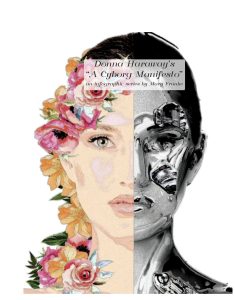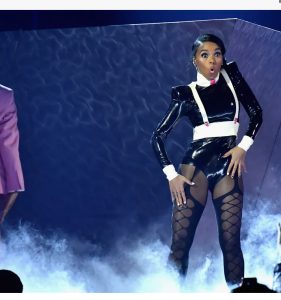Donna Haraway’s “Cyborg Manifesto” (1985) and Janelle Monáe’s “Dirty Computer” (2018) share similar themes that explore identity, fluidity, and resistance, offering equivalent visions of empowerment. Haraway’s essay imagines a post-gender world where human, machine, and animal boundaries blur, challenging rigid definitions of identity. Janelle Monáe’s Dirty Computer reflects this by depicting a world where people who do not conform to societal norms in terms of gender, race, and sexuality, are labeled as “dirty”. They both present hybrid identities as a form of rebellion against oppressive systems. In Cyborg Manifesto, Haraway rejects binary thinking, presenting the cyborg as a metaphor for dismissing clear distinctions between categories like human and machine, or male and female. Monáe embodies this cyborg identity by incorporating different musical genres and playing with her own persona throughout Dirty Computer. Her songs like “Pynk” discusses the fluidity of gender and sexuality, embracing multiplicity rather than fixed labels. In “I Like That,” Monáe challenges societal pressures to conform, taking pride in her “crazy, sexy, cool, Black and nerdy” self, embodying Haraway’s belief that embracing different identities is a journey toward freedom.

Monáe’s android alter ego, present throughout her work but especially highlighted in Dirty Computer, functions as a cyborg-like figure, embodying hybridity. Songs like “Make Me Feel” challenge norms of sexuality in a way that resonates with Haraway’s vision of post-gender identity. Through her lyrics and visual storytelling, Monáe disembodies binary constructs and celebrates difference. Her album is an anthem for those including people of color and others whose identities do not conform to societal expectations. Monáe’s use of technology as a theme and a tool parallels Haraway’s use of the cyborg metaphor. In Dirty Computer, technology becomes both the mechanism of control and a means of resistance. Technology also gives these characters a way to fight back, to reclaim their “dirty” identities and refuse to be forgotten. This reflects Haraway’s idea that technology, rather than being inherently oppressive, can be a space for liberation when wielded. Haraway and Monáe emphasize that the fluidity of identity whether cyborg or human, threatens oppressive structures like patriarchy, racism, and homophobia. In Dirty Computer, Monáe’s android persona fights against a system that dehumanizes those who do not fit a certain standard, much like Haraway’s cyborg disrupts traditional boundaries.

Published by